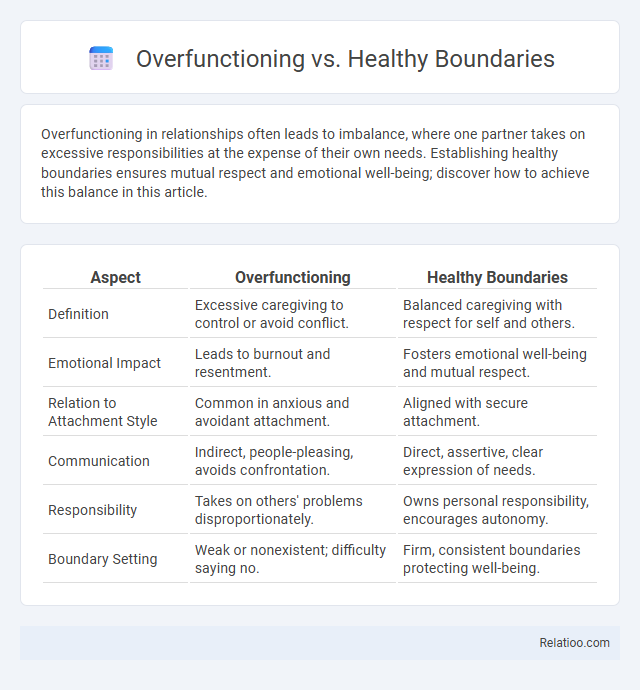Overfunctioning in relationships often leads to imbalance, where one partner takes on excessive responsibilities at the expense of their own needs. Establishing healthy boundaries ensures mutual respect and emotional well-being; discover how to achieve this balance in this article.
Table of Comparison
| Aspect | Overfunctioning | Healthy Boundaries |
|---|---|---|
| Definition | Excessive caregiving to control or avoid conflict. | Balanced caregiving with respect for self and others. |
| Emotional Impact | Leads to burnout and resentment. | Fosters emotional well-being and mutual respect. |
| Relation to Attachment Style | Common in anxious and avoidant attachment. | Aligned with secure attachment. |
| Communication | Indirect, people-pleasing, avoids confrontation. | Direct, assertive, clear expression of needs. |
| Responsibility | Takes on others' problems disproportionately. | Owns personal responsibility, encourages autonomy. |
| Boundary Setting | Weak or nonexistent; difficulty saying no. | Firm, consistent boundaries protecting well-being. |
Understanding Overfunctioning: Definition and Signs
Overfunctioning refers to taking on excessive responsibility for others' tasks or emotions, often leading to burnout and imbalance in relationships. Key signs include consistently managing others' problems, neglecting personal needs, and feeling indispensable or guilty when not helping. Recognizing these patterns is crucial to establish healthy boundaries that promote mutual respect and emotional well-being.
What Are Healthy Boundaries?
Healthy boundaries are clear, respectful limits that define acceptable behavior in relationships, promoting mutual respect and personal autonomy. They prevent overfunctioning by encouraging individuals to take responsibility for their own needs without enabling others' dependency or control. Establishing healthy boundaries supports emotional well-being and balanced interactions, contrasting with overfunctioning patterns that can lead to burnout and resentment.
The Psychology Behind Overfunctioning
Overfunctioning often stems from underlying issues such as anxiety, low self-esteem, or a deep-seated need for control, which can lead you to take on excessive responsibilities at the expense of your well-being. Healthy boundaries involve recognizing your limits and asserting your needs without guilt, fostering balanced relationships and preventing burnout. Understanding the psychology behind overfunctioning helps identify when you're sacrificing your own needs to maintain control or approval, enabling a shift toward healthier, more sustainable patterns.
Common Causes of Overfunctioning in Relationships
Common causes of overfunctioning in relationships include fear of abandonment, low self-esteem, and a desire to control outcomes to avoid conflict. Individuals who overfunction often take on excessive responsibility to compensate for perceived partner inadequacies or to maintain a sense of stability. This dynamic can blur the line between healthy boundaries and codependency, leading to emotional exhaustion and imbalance in the relationship.
Consequences of Lacking Healthy Boundaries
Lacking healthy boundaries often leads to overfunctioning, where individuals take on excessive responsibilities to compensate for others' shortcomings, resulting in emotional exhaustion and burnout. This behavior can create codependent dynamics, hinder personal growth, and diminish overall well-being. Without clear boundaries, stress levels rise, relationships become imbalanced, and long-term mental health issues may develop.
Overfunctioning vs. Healthy Boundaries: Key Differences
Overfunctioning involves taking on excessive responsibilities or controlling others' tasks, often leading to burnout and enabling dependency, while healthy boundaries establish clear limits that protect personal well-being and promote mutual respect. Unlike overfunctioning, healthy boundaries foster balanced relationships by encouraging autonomy and accountability without overstepping emotional or physical limits. Key differences include the motivation behind actions--overfunctioning stems from anxiety or control needs, whereas healthy boundaries arise from self-awareness and respect for both self and others.
Recognizing Overfunctioning in Your Daily Life
Recognizing overfunctioning in your daily life involves identifying patterns where you consistently take on excessive responsibilities, often to compensate for others' lack of action. This behavior can lead to burnout and blurred limits, undermining healthy boundaries that protect your emotional and physical well-being. Developing awareness of overfunctioning helps you establish clear boundaries, promote balanced relationships, and maintain your personal health.
Strategies to Shift from Overfunctioning to Healthy Boundaries
Shifting from overfunctioning to healthy boundaries involves recognizing personal limits and practicing assertive communication to express needs clearly. Implementing self-care routines and prioritizing tasks based on realistic capacity reduces stress and prevents burnout. Consistently reflecting on emotional responses helps reinforce boundary-setting and fosters balanced relationships.
Benefits of Establishing Healthy Boundaries
Establishing healthy boundaries enhances emotional well-being by preventing overfunctioning behaviors, which often lead to burnout and resentment. Clear boundaries promote mutual respect and empower individuals to prioritize their needs while supporting others effectively. This balance fosters healthier relationships and sustained personal growth.
Steps to Maintain Healthy Boundaries Long-Term
Establishing clear communication and consistently reinforcing personal limits are crucial steps to maintain healthy boundaries long-term, preventing overfunctioning behaviors that lead to burnout. Regular self-assessment and setting realistic expectations help individuals balance support for others while preserving their own well-being. Developing assertiveness skills and seeking external support when necessary further sustain healthy boundaries by reducing tendencies to overfunction in relationships.

Infographic: Overfunctioning vs Healthy Boundaries
 relatioo.com
relatioo.com